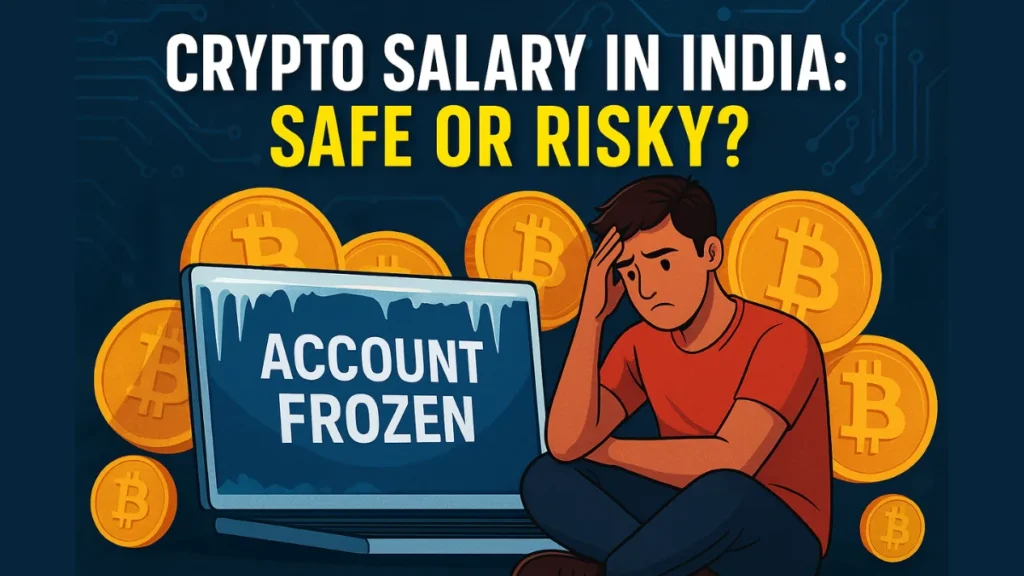A new generation of Indian workers is earning in crypto—but instead of freedom, they’re getting frozen bank accounts, cybercrime cases, and zero support.
When Crypto Becomes Your Paycheck
Remote work. Web3 jobs. Payments in stablecoins like USDT. For a growing number of Indian professionals, this isn’t just a futuristic concept—it’s their everyday reality.
A 24-year-old B.Tech graduate earns $1100/month working for a Web3 game. On paper, it’s a dream gig. In practice? It’s a nightmare.

Why? Because India still doesn’t know how to treat people who get paid in crypto.
The Risks of Peer-to-Peer Cashouts
With no proper support from banks, freelancers turn to P2P (peer-to-peer) crypto marketplaces. They sell their crypto to someone who transfers rupees to their account.
The catch?
- Bank accounts get frozen without warning
- Cybercrime complaints are filed
- Friends and family begin asking if you’re doing something illegal
Forget trust—the word “crypto” is enough to trigger suspicion, audits, and endless scrutiny.
“Three cases, ₹55,000 stuck, and zero help,” one freelancer told us. “I work 10 hours a day just to be treated like a criminal.”
Why Crypto = Red Flag in India
India hasn’t banned crypto. But it hasn’t supported it either.
Once your crypto enters the banking system, you’re suddenly subject to:
- 30% flat tax on perceived profits
- 1% TDS on every sale
- Zero distinction between salary vs. trading
Even if you’re not speculating, the system treats you like you are. The result? Legit crypto earners face the same red tape as shady traders.
The PayPal Pivot
Frustrated and exhausted, many workers are ditching crypto rails. Instead, they’re asking their employers to send money via PayPal or Wise—not ideal, but safer.
- Yes, you lose up to 10% in fees and exchange rates.
- But you get peace of mind, and that’s priceless.
“PayPal may cost more, but at least my account isn’t getting frozen,” one worker told fdaytalk. “I’d rather lose money than live in fear.”
Expert Tips to Avoid Crypto Salary Headaches
Industry professionals recommend these safer alternatives for freelancers earning in crypto:
- Use Wise or Payoneer for smoother, lower-fee international payments—better than PayPal.
- Spend directly with crypto cards like Avici Money or Wirex to bypass local exchanges.
- Stick to regulated Indian platforms like CoinDCX or ZebPay if you must convert to INR.
- Consider offshore accounts (e.g., in Dubai) for high-volume or long-term crypto income.
These aren’t just workarounds—they’re smart tools to help freelancers stay compliant and stress-free in a system that’s still catching up.
The Real Issue? Regulation Vacuum
There’s no single authority that handles crypto income in India. So banks, police, and tax officers treat it however they want.
And guess who pays the price? Honest, hardworking freelancers.
“Explaining my USDT salary to a bank officer felt like telling them I earn Monopoly money.”
What India Needs Now
Crypto isn’t going anywhere. But India’s freelancers might—if nothing changes.
Here’s what’s urgently needed:
- Clear crypto income rules (different from trading taxes)
- Banking support for legitimate crypto jobs
- Education for frontline staff and cybercrime units
- Safe off-ramps for converting earnings to INR
Until then, the smartest move? Avoid the crypto rails entirely at least if you want to sleep well.

